#Leon Jessel
Explore tagged Tumblr posts
Text
Advertisements for March 1923 records from Victor and Columbia in the New York Times in February 1923. Victor's advertisement from February 15,1923 shows Russian bass Feodor Chaliapin recording a version of the Russian folk song "Song of the Volga Boatman" (there is a version of that song used in Punch-Out as Soda Popinski's music). A version of the hit song "Carolina in the Morning" and Paul Whiteman Orchestra's version of "Parade of the Wooden Soldiers" is shown. (That would be one of the most popular songs of 1923).
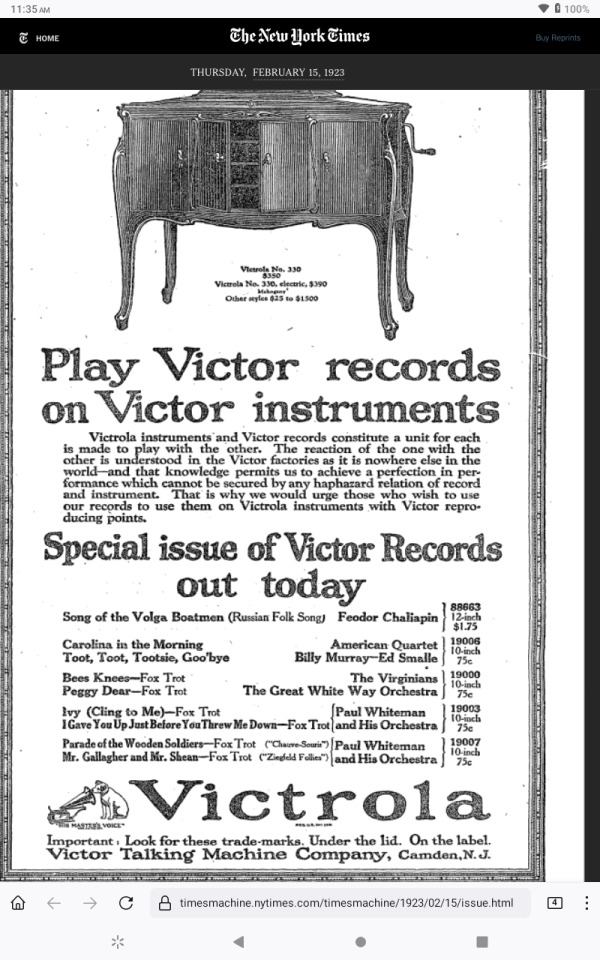


You can hear Whiteman Orchestra's version of Parade here:
youtube
Columbia's February 20, 1923 advertisement shows that it has a few blues records, some classical music and opera, some show tunes, and some pop songs sung by Al Jolson and Eddie Cantor. This is the St. Louis Blues version by Ted Lewis's band advertised by Columbia (which was a song written by W.C. Handy)
youtube
And that concludes today's look at what two of the leading bandleaders of the 1920s were doing late 1922/early 1923.
#columbia records#victor records#jazz music#Parade of the Wooden Soldiers#st. louis blues#paul whiteman#Ted Lewis#Leon Jessel#W. C. Handy#Youtube
8 notes
·
View notes
Photo

A Funny Thing Happened on the Way to the Forum
directed by Richard Lester, 1966
#A Funny Thing Happened on the Way to the Forum#Forum#Richard Lester#movie mosaics#Zero Mostel#Jack Gilford#Phil Silvers#Michael Hordern#Patricia Jessel#Michael Crawford#Annette Andre#Buster Keaton#Leon Greene
7 notes
·
View notes
Photo
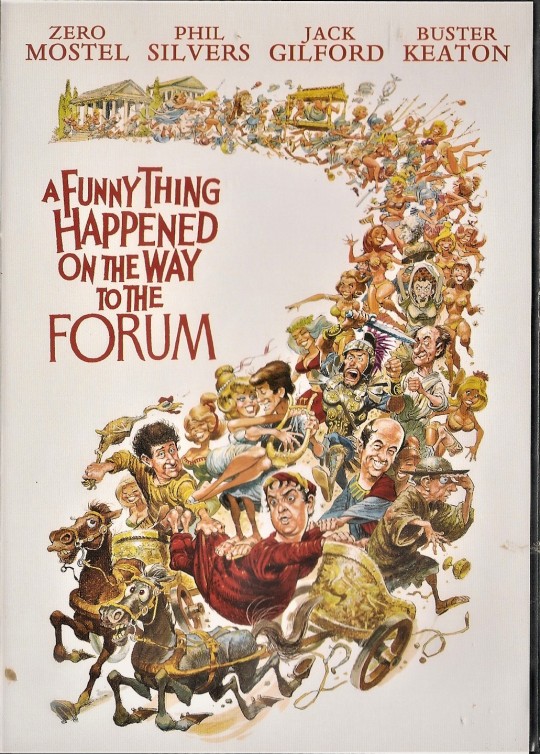
Bad movie I have A Funny Thing Happened on the Way to the Forum 1966
#A Funny Thing Happened on the Way to the Forum#Melvin Frank Production#Zero Mostel#Phil Silvers#Buster Keaton#Michael Crawford#Jack Gilford#Annette Andre#Michael Hordern#Leon Greene#Roy Kinnear#Alfie Bass#John Bluthal#Pamela Brown#Patricia Jessel#Beatrix Lehmann#Frank Thornton#Peter Butterworth#John Bennett#Andrew Faulds#Jennifer Baker#Susan Baker#Ronnie Brody#Frank Elliott#Lucienne Bridou#Helen Funai#Bill Kerr#Jack May#Inga Neilsen#Jon Pertwee
12 notes
·
View notes
Text
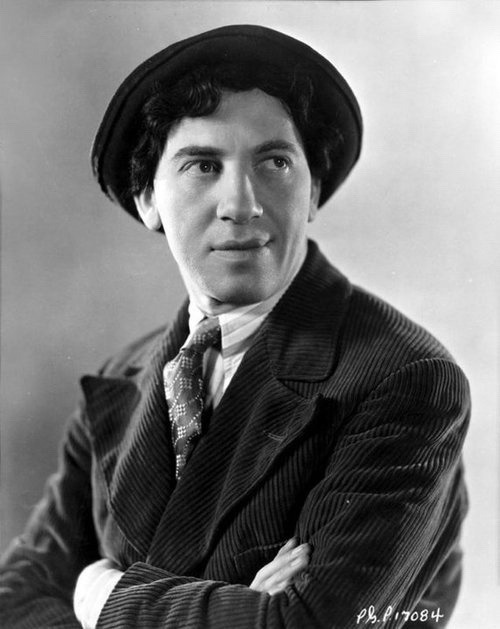
Leonard Joseph "Chico" Marx (March 22, 1887 – October 11, 1961) was an American comedian, musician, actor and film star. He was a member of the Marx Brothers (with Groucho Marx, Harpo Marx, and Zeppo Marx). His persona in the act was that of a charming, uneducated but crafty con artist, seemingly of rural Italian origin, who wore shabby clothes and sported a curly-haired wig and Tyrolean hat. On screen, Chico is often in alliance with Harpo, usually as partners in crime, and is also frequently seen trying to con or outfox Groucho. Leonard was the oldest of the Marx Brothers to live past early childhood (first-born Manfred Marx had died in infancy). In addition to his work as a performer, he played an important role in the management and development of the act in its early years.
Chico was born in Manhattan, New York City, on March 22, 1887. His parents were Sam Marx (called "Frenchie" throughout his life), and his wife, Minnie Schoenberg Marx. Minnie's brother was Al Shean. The Marx family was Franco-German Jewish. His father was a native of Alsace who worked as a tailor and his mother was from East Frisia in Germany.
Billing himself as Chico, he used an Italian persona for his onstage character; stereotyped ethnic characters were common with vaudevillians. His non-Italian-ness was specifically referred to twice on film. In their second feature, Animal Crackers, he recognizes someone he knows to be a fish peddler impersonating a respected art collector:
Ravelli (Chico): "How is it you got to be Roscoe W. Chandler?"
Chandler: "Say, how did you get to be an Italian?"
Ravelli: "Never mind—whose confession is this?"
In A Night at the Opera, which begins in Italy, his character, Fiorello, claims not to be Italian, eliciting a surprised look from Groucho:
Driftwood (Groucho): "Well, things seem to be getting better around the country."
Fiorello (Chico): "I don't know, I'm a stranger here myself."
A scene in the film Go West, in which Chico attempts to placate an Indian chief of whom Groucho has run afoul, has a line that plays a bit on Chico's lack of Italian nationality, but is more or less proper Marxian wordplay:
S. Quentin Quayle (Groucho): "Can you talk Indian?"
Joe Panello (Chico): "I was born in Indianapolis!"
There are moments, however, where Chico's characters appear to be genuinely Italian; examples include the film The Big Store, in which his character Ravelli runs into an old friend he worked with in Naples (after a brief misunderstanding due to his accent), the film Monkey Business, in which Chico claims his grandfather sailed with Christopher Columbus, and their very first outing The Cocoanuts, where Mr. Hammer (Groucho) asks him if he knew what an auction was, in which he responds "I come from Italy on the Atlantic Auction!" Chico's character is often assumed to be dim-witted, as he frequently misunderstands words spoken by other characters (particularly Groucho). However, he often gets the better of the same characters by extorting money from them, either by con or blackmail; again, Groucho is his most frequent target.
Chico was a talented pianist. He originally started playing with only his right hand and fake playing with his left, as his teacher did so herself. Chico eventually acquired a better teacher and learned to play the piano correctly. As a young boy, he gained jobs playing piano to earn money for the Marx family. Sometimes Chico even worked playing in two places at the same time. He would acquire the first job with his piano-playing skills, work for a few nights, and then substitute Harpo on one of the jobs. (During their boyhood, Chico and Harpo looked so much alike that they were often mistaken for each other.)
In the brothers' last film, Love Happy, Chico plays a piano and violin duet with 'Mr. Lyons' (Leon Belasco). Lyons plays some ornate riffs on the violin; Chico comments, "Look-a, Mister Lyons, I know you wanna make a good impression, but please don't-a play better than me!"
In a record album about the Marx Brothers, narrator Gary Owens stated that "although Chico's technique was limited, his repertoire was not." The opposite was true of Harpo, who reportedly could play only two tunes on the piano, which typically thwarted Chico's scam and resulted in both brothers being fired.
Groucho Marx once said that Chico never practiced the pieces he played. Instead, before performances he soaked his fingers in hot water. He was known for 'shooting' the keys of the piano. He played passages with his thumb up and index finger straight, like a gun, as part of the act. Other examples of his keyboard flamboyance are found in A Night at the Opera (1935), where he plays the piano for a group of delighted children, and A Night in Casablanca (1946), where he performs a rendition of "The Beer Barrel Polka".
Chico became the unofficial manager of the Marx Brothers after their mother, Minnie, died in 1929. As manager, he cut a deal to get the brothers a percentage of a film's gross receipts—the first of its kind in Hollywood. Furthermore, it was Chico's connection with Irving Thalberg of Metro-Goldwyn-Mayer that led to Thalberg's signing the Brothers when they were in a career slump after Duck Soup (1933), the last of their films for Paramount.
For a while in the 1930s and 1940s, Chico led a big band. Singer Mel Tormé began his professional career singing with the Chico Marx Orchestra. Through the 1950s, Chico occasionally appeared on a variety of television anthology shows and some television commercials, most memorably with Harpo in "The Incredible Jewelry Robbery", a pantomime episode of General Electric Theater in 1959.
His nickname (acquired during a card game in Chicago in 1915) was originally spelled Chicko. It was changed to Chico but still pronounced "Chick-oh" although those who were unaware of its origin tended to pronounce it "Cheek-oh". Numerous radio recordings from the 1940s exist where announcers and fellow actors mispronounce the nickname, but Chico apparently felt it was unnecessary to correct them. As late as the 1950s, Groucho was happy to use the wrong pronunciation for comedic effect. A guest on You Bet Your Life told the quizmaster she grew up around Chico (California) and Groucho responded, "I grew up around Chico myself. You aren't Gummo, are you?" Groucho is heard in videos pronouncing it "Chicko", as in a Dick Cavett episode with Groucho talking to Dan Rowan.
During Groucho's live performance at Carnegie Hall in 1972, he states that his brother got the name Chico because he was a "chicken-chaser" (early 20th century slang for womanizer).
As well as being a compulsive womanizer, Chico had a lifelong gambling habit. His favorite gambling pursuits were card games, horse racing, dog racing, and various sports betting. His addiction cost him millions of dollars by his own account. When an interviewer in the late 1930s asked him how much money he had lost from gambling, he answered, "Find out how much money Harpo's got. That's how much I've lost." Gummo Marx, in an interview years after Chico's death, said: "Chico's favorite people were actors who gambled, producers who gambled, and women who screwed." Referring to Chico's love life, George Jessel quipped, "Chico didn't button his fly until he was seventy."
Chico's lifelong gambling addiction compelled him to continue in show business long after his brothers had retired in comfort from their Hollywood income, and in the early 1940s he found himself playing in the same small, cheap halls in which he had begun his career 30 years earlier. The Marx Brothers' penultimate film, A Night in Casablanca (1946), was made for Chico's benefit since he had filed for bankruptcy a few years prior. Because of his out-of-control gambling, the brothers finally took the money as he earned it and put him on an allowance, on which he stayed until his death.
Chico had a reputation as a world-class pinochle player, a game he and Harpo learned from their father. Groucho said Chico would throw away good cards (with the knowledge of spectators) to make the play "more interesting". Chico's last public appearance was in 1960, playing cards on the television show Championship Bridge. He and his partner lost the game.
Chico was married twice. His first marriage was to Betty Karp in 1917. Their union produced one daughter named Maxine (1918–2009). His first marriage was plagued by his infidelity, ending in divorce in 1940; he was very close to his daughter Maxine and gave her acting lessons.
Chico's second marriage was to Mary De Vithas. They married in 1958, three years before his death.
In the 1974 Academy Awards telecast, Jack Lemmon presented Groucho with an honorary Academy Award to a standing ovation. The award was also for Harpo, Chico, and Zeppo, whom Lemmon mentioned by name. It was one of Groucho's final major public appearances. "I wish that Harpo and Chico could be here to share with me this great honor," he said, naming the two deceased brothers (Zeppo was still alive at the time and in the audience). Groucho also praised the late Margaret Dumont as a great straight woman who never understood any of his jokes.
Chico died of arteriosclerosis at age 74 on October 11, 1961, at his Hollywood home. He was the eldest brother and the first to die.
Chico is entombed in the mausoleum at Forest Lawn Memorial Park Cemetery in Glendale, California. Chico's younger brother Gummo is in a crypt across the hall from him.
6 notes
·
View notes
Photo
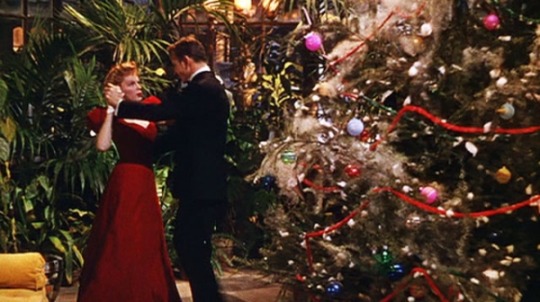
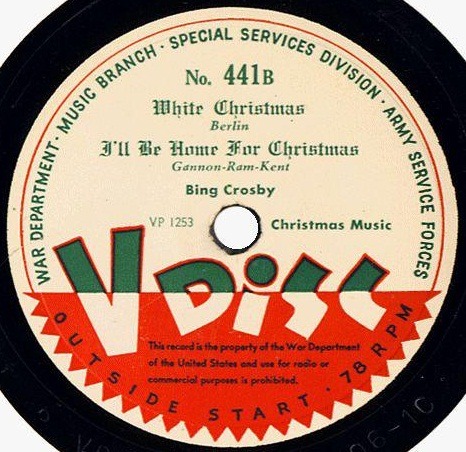
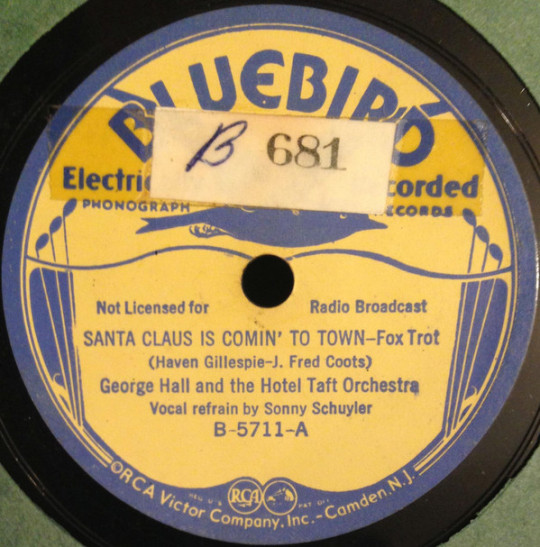
Chart-Topping Christmas Singles — 1920-1945
Popular Christmas themed songs aren’t a new thing — they saw their infancy in the 1930s, and by the 1940s many popular seasonal songs from films and by popular artists were making the charts. These popular Christmas songs tended to be about not only Christmas, but also wintertime and the season in general and did not typically have overtly religious themes (a change from the carols of the pre-1930s).
Below is a list of chart-topping Christmas singles that would have been radio favorites between 1920 and 1945. Many of those released during WWII would be also been release on V-Disc to US military personnel, so it is highly likely they would be familiar to our boys while they were overseas.
Auld Lang Syne - Peerless Quartet | 1921
Reached No. 5 on the Pop charts.
Written by Robert Burns.
Guy Lombardo and His Royal Canadians first performed the song on radio in 1929, then recorded it in 1939.
Parade of the Wooden Soldiers - Vincent Lopez Orchestra | 1922
The Vincent Lopez Orchestra version peaked at No. 3 on the pop singles chart.
Other charted versions include Carl Fenton's Orchestra (1922), and Paul Whiteman and His Orchestra (1923).
Music written in 1897 by Leon Jessel and popularized by Nikita Balieff's 1920s musical revue La Chauve-Souris.
Adeste Fideles (O Come, All Ye Faithful) - Associated Glee Clubs of America | 1925
Peaked at No. 5 on the pop singles chart.
Santa Claus Is Comin' to Town - George Hall and the Hotel Taft Orchestra | 1934
Written in 1933 by Haven Gillespie and J. Fred Coots.
Other notable hit versions were by Bing Crosby and The Andrews Sisters (1943)
Winter Wonderland - Guy Lombardo and His Royal Canadians | 1934
Lombardo's version peaked at No. 2 on the pop singles chart.
A version by Ted Weems and his Orchestra peaked at No. 13 on the pop singles chart.
Written in 1934 by Felix Bernard (composer) and Richard B. Smith (lyricist).
Jingle Bells - Benny Goodman and his Orchestra | 1935
B-Side was Santa Claus Is Comin' To Town by the Tommy Dorsey Orchestra.
A version was released in 1941 with by Glenn Miller and his Orchestra, featuring vocals by Tex Beneke, Ernie Caceres and The Modernaires.
Other hit versions recorded by Bing Crosby and The Andrews Sisters (1943)
Silent Night - Bing Crosby | 1935
Written on Christmas Eve in 1818 in Germany by Franz Gruber under the title "Stille Nacht, heilige Nacht".
Crosby's hit version features the Victor Young Orchestra and backing vocals by the Guardsmen Quartet.
First known recorded version in the U.S. was by Paul Whiteman and His Orchestra in 1928.
What Will Santa Claus Say (When He Finds Everybody Swingin'?) - Louis Prima and his New Orleans Gang | 1936
The Little Boy that Santa Claus Forgot - by Vera Lynn | 1937
(Don't Wait 'Till) The Night Before Christmas - Eddy Duchin and his Orchestra | 1938
Featuring vocals by Stanley Worth. Peaked at No. 9 on the pop singles chart.
Babes in Toyland/March of the Toys - Tommy Dorsey Orchestra | 1939
Written by Victor Herbert and Glen MacDonough.
Hello, Mr. Kringle - Kay Kyser and his Orchestra | 1939
Novelty record with Ginny Simms, Ish Kabibble, Sully Mason & Harry Babbitt on vocals.
The Night Before Christmas - Milton Cross | 1939
Recitation of Clement Moore's famous 1823 poem "A Visit from St. Nicholas" with musical background orchestrated by Victor Salon.
When Winter Comes - Artie Shaw & his Orchestra | 1939
Peaked at No. 6 on the pop singles chart.
Featuring vocals by Tony Pastor.
From the 1939 film Second Fiddle.
Snowfall - Claude Thornhill and His Orchestra | 1941
Written by Claude Thornhill.
Winter Weather - Benny Goodman | 1941
Peaked at No. 24 on the pop singles chart.
Featuring Peggy Lee and Art Lund on vocals.
Also recorded in 1941 by Fats Waller.
Happy Holiday - Bing Crosby | 1942
Written by Irving Berlin for the 1942 film Holiday Inn, co-starring Crosby and Fred Astaire.
Hit versions were recorded by Peggy Lee, Andy Williams, and Steve Lawrence & Eydie Gorme.
White Christmas - Bing Crosby | 1942
Spent eleven weeks at No. 1 on Billboard's National Best Selling Retail Records chart and three weeks at No. 1 on Billboard's Harlem Hit Parade chart in late 1942.
Written by Irving Berlin.
This version featured the Ken Darby Singers and John Scott Trotter's Orchestra.
The song debuted in the 1942 film Holiday Inn (sung by Crosby).
Other charting recordings by Gordon Jenkins (1942), Charlie Spivak (1942), Frank Sinatra (1944), Freddy Martin (1945)
I'll Be Home for Christmas - Bing Crosby | 1943
Written during World War II by Kim Gannon, Walter Kent and Buck Ram to honor soldiers overseas.
Let's Start the New Year Right - Bing Crosby | 1943
With the Bob Crosby orchestra.
From the 1942 film Holiday Inn.
Have Yourself a Merry Little Christmas - Judy Garland | 1944
Peaked at No. 27 on the pop singles chart.
Featuring orchestration by Georgie Stoll.
Written by Ralph Blane and Hugh Martin
Introduced in the 1944 film Meet Me in St. Louis starring Garland.
The Bells of St. Mary's - Bing Crosby | 1945
Written by A. Emmett Adams and Douglas Furber in 1917.
While the song has no lyrical relation to Christmas, its inclusion in the 1945 film of the same name has made it a popular choice for various artists' holiday albums.
Christmas Carols by the Old Corral - by Tex Ritter | 1945
Peaked at No. 2 on Billboard's Most-Played Juke Box Folk Records chart.
Let It Snow! Let It Snow! Let It Snow! - Vaughn Monroe | 1945
Written by Sammy Cahn and Jule Styne.
Image Sources
Judy Garland and Tom Drake in 1944′s “Meet Me in St. Louis” | Source “White Christmas” and “I’ll be home for Christmas” V-Disc | Source “Sant Claus is Coming to Town” | Source
[ Support SRNY on Patreon! ]
#Steve Rogers#christmas#Christmas songs#Christmas music#Christmas carols#1920s#1930s#1940s#seasonal#festive#Bing Crosby#early 20th century#captain america#Captain America: The First Avenger#CAPTAIN AMERICA REFERENCE#Captain America: TFA#fanfiction#fanfic#Fanfic references#fanfic research#research#reference#fan fic writing#V-disc#bucky#Bucky Barnes#james bucky barnes#historically accurate#1920s music#1930s music
67 notes
·
View notes
Text
Leon Jessel- Was he misguided, believing the Nazis would leave him alone?
Leon Jessel- Was he misguided, believing the Nazis would leave him alone?
View On WordPress
0 notes
Text
January 22 in Music History
1649 Birth of French composer Pascal Collasse in Reims.
1707 Birth of composer Carl Hock.
1709 Birth of composer Joseph Reipel.
1729 Birth of Italian composer Guiseppe Luigi Tibaldi.
1748 Birth of composer Lewis Edison.
1753 Birth of composer Peter Fuchs.
1756 Birth of Italian composer Vincenzo Righini.
1766 the Mozart children perform at the Oude Doelen FP of Wolfgang's London symphonies, K. 19, K. 22.
1775 Birth of Spanish composer Manuel del Popolo Vicente Rodriguez Garcia.
1779 Birth of Italian composer Stefano Pavesi.
1781 Birth of French composer, conductor and violinist Francois-Antoine Habeneck in Mezieres.
1815 Birth of composer Ferdinand Christian Wilhelm Praeger.
1824 Birth of Czech composer Josef Leopold Zvonar in Prague.
1842 Birth of composer Charles Henri Marechal.
1855 Birth of composer Ernst Kullak.
1859 FP of Brahms' Piano Concerto No. 1. Brahms was soloist in Hanover.
1861 Birth of composer Karel Stecker.
1861 Death of castrato Giovanni Battista Vellutti.
1870 Birth of French organist and composer Charles Arnold Tournemire in Bordeaux.
1871 Birth of composer Leon Jessel.
1876 Death of English hymn composer John Bacchus Dykes in Ticehurst.
1882 Birth of Argentinian composer, pianist Ernesto Drangosch.
1886 Birth of American composer John Joseph Becker in Henderson, Ky.
1887 Birth of mexican mezzo-soprano Fanny Anitua in Durango.
1887 FP of Gilbert & Sullivan's operetta Ruddigore at the Svoy Theatre in London.
1889 Founding of the Columbia Phonograph Company, Washington, DC.
1894 FP of A. Glazunov's Symphony No. 4, in St.Petersburg.
1897 Birth of composer Josef Stanislav.
1897 Birth of American soprano Rosa Ponselle in Meriden, Connecticut.
1898 Birth of composer Alexander Abramsky.
1898 Birth of composer Gustav Paulson.
1900 Birth of composer Franz Salmhofer.
1901 Birth of German born Austrian composer Hans Erich Apostel.
1903 Birth of English composer Robin Humphrey Milford in Oxford.
1907 FP in USA of Richard Strauss' opera Salome by the MET in NYC. Critics called it a scandal. It was cancelled after this performance. Later staged at the Met in 1930.
1908 FP of Stravinsky's Symphony No. 1 in St. Petersburg.
1911 Birth of Belgian soprano Suzanne Danco in Brussels, Belgium.
1914 Birth of Greek composer Dimitris Dragatakis in Platanoussa, Epirus.
1914 Birth of soprano Emmy Loose in Karbiz, Czech.
1916 Birth of French composer Henri Dutilleux in Angers.
1920 Birth of American baritone William Warfield in West Helena, Arkansas.
1920 Birth of baritone Rudolf Jedlicka in Skalice, Czech.
1923 Birth of American composer Leslie Bassett in Hanford, CA.
1923 Birth of German composer Friedrich Zehm in Neusalz an der Oder, Silesia.
1923 Death of baritone Joachim Tartakov.
1926 Birth of Swiss flutist Aurele Nicolet in Neuchatel, Switzerland.
1927 Birth of baritone Hans Gunter Nocker in Westfalen.
1934 FP of first version of D. Shostakovich's opera Lady Macbeth of the Mtsensk District at the Maliiy Opera Theater in Leningrad.
1935 Death of music theorist Heinrich Schenker in Vienna
1936 FP of Paul Hindemith's Trauermusik 'Music of Mourning' for Viola and String Orchestra. BBC memorial concert broadcast for King George V of England who died on 20 JAN 1935. Sir Adrian Boult conducting and Hindemith was soloist.
1948 Death of tenor Rudolf Jager.
1949 Birth of American composer, conductor Dean Drummond in Los Angeles, CA.
1953 Birth of South Korean conductor and pianist Myung-Whun Chung.
1964 Death of Philadelphia born composer Marc Blitzstein from brain injury received in a barroom fight in Fort-de-France, Martinique. Age 58.
1970 FP of Carlisle Floyd's opera Of Mice and Men in Seattle. Perhaps the most frequently performed American opera.
1980 FP, in concert, of John Williams' Cowboys Overture by the Boston Pops, conducted by the composer, his first year with the Pops. From Williams' film score The Cowboys, in Boston.
1982 Birth of tenor Miervaldis Jenes.
1982 Death of baritone Hans Fidesser.
1993 Death of soprano Patricia Brooks.
1997 Death of tenor Seth McCoy.
1998 FP of Bright Sheng's Postcards at the University of Minnesota. Saint Paul Chamber Orchestra, Hugh Wolff conducting in Minneapolis, MN.
1999 Death of tenor Gabor Carelli.
2000 Death of tenor Carlo Cossutta.
2003 FP of Judith Weir's The Welcome Arrival of Rain. Minnesota Orchestra, Osmo Vanska, conducting in Minneapolis, MN.
2004 FP of Leo Brouwer's Concerto for Two Guitars. John Christopher Williams and Costas Kotsiolis, soloists with the Camerata Orchestra in Athens, Greece.
0 notes
Text
RT @CllrLeonGirling: @Loughtonfan @savejesselgreen Hi Sue. I hope you had a good Xmas. Do you know if Jessel Green was made up of landfill/Hse building materials? Also lots of residents telling me about hidden streams. Do you know anything from your research. Thanks Leon
Hi Sue. I hope you had a good Xmas. Do you know if Jessel Green was made up of landfill/Hse building materials? Also lots of residents telling me about hidden streams. Do you know anything from your research. Thanks Leon
— Leon Girling (@CllrLeonGirling) December 31, 2017
from Twitter https://twitter.com/darren_lock December 31, 2017 at 05:18PM via IFTTT
0 notes
Photo

Poster for La Chauve-Souris (1922)
A revue with roots in pre-revolutionary Russia, La Chauve-Souris toured Europe and the United States and featured a number that many will still recognize today, "Parade of the Wooden Soldiers" by Leon Jessel.
1 note
·
View note
Video
youtube
For our mid-week Marches Madness installment, we have Leon Jessel's Parade of the Wooden Soldiers, complete with Rockettes!
0 notes
Text
Leon Jessel- Was he misguided, believing the Nazis would leave him alone?
Leon Jessel- Was he misguided, believing the Nazis would leave him alone?

Leon Jessel,(January 22, 1871 – January 4, 1942) was a German composer of operettas and light classical music pieces. Althouh if I had beem up to his parents Samuel and Mary Jessel, he would have become a textile sales man.His Father however was a gifted violinist.
Today Leon Jessel is best known internationally as the composer of the popular jaunty march The Parade of the Tin Soldiers, also…
View On WordPress
0 notes